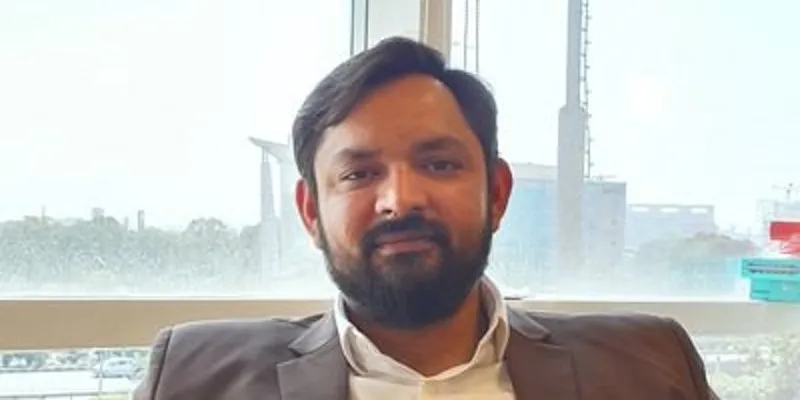How this farmer’s son built an agritech startup to bring business and scale to agriculture in rural India
Gurugram-based B2B agritech ecommerce platform SmartFarms empowers farmers with information and essential products to reap higher profits. It has 60 smart hubs at present and aims to expand to up to 2,000 in the next year.
Satish Sherawat’s father, a farmer, always told his son to aim for more in life and not be a farmer. And, for a long time, he heeded the advice and set his sights on other ambitions.
Thinking back, he realises that farming, as a profession was looked down upon. And, when Satish looked deeper, he found that farmers thought of their profession as a vicious cycle, something they could just not live off. He found that they were heavily disadvantaged by the general lack of information and unavailability of essential products.
“I wanted to get rid of the mentality that farming was an occupation that people had to look down upon. No one ever thought about rural development. I wanted to change the feeling of desertion and isolation among farmers. I want farmers to take to farming as a business rather than just a means of livelihood,” says 33-year-old Satish.
This awakening led him to start SmartFarms early this year in Gurugram. It a B2B ecommerce platform built to empower farmers with information and products to make farming a more profitable business.
“SmartFarms aims to make farmers feel proud and change the rural landscape in India,” Satish says.

The team of SmartFarms
Challenges and building the team
The entrepreneur did face a few challenges starting up. Satish explains that to build an ecommerce platform for rural India, deep knowledge about rural India is a prime requirement. The other big and related challenges are logistics and building trust in online products. Agritech entities can only scale if they have generic growth and the fastest delivery network.
To tackle these, Satish first focused on building a team. The people he brought on board had extensive knowledge about rural India and a combined experience of over 62 years in the sector.
Satish roped in Raj Shekhar Sinha as the co-founder, as he shared the dream of building a sustainable model for farmers. Soon, they roped in SP Malik, who had served in the Chief Seed Certification office of the Haryana government and came with more than 40 years of experience in the agriculture sector, as the Chief Agri Advisor.
Mahantesh Chulaki, who has come on board as the Business Head, Operations and Logistics, had worked in Ninjacart, while Virendra Kumar, Manager, Farmer's Division, has more than eight years of experience working with the biggest FMCG companies in India and has reached out to more than 250,000 farmers in the country.
“Another challenge was trying to understand how the industry works. I had no prior experience or understanding of the startup scenario in India. When we started working out of WeWork , the community team introduced me to the HR and the sales team who helped build my team,” Satish says.
Together, the now 20-strong team has set up tech-enabled logistics solutions and a delivery network for farmers. Satish shares that they have added more than 600 products to the platform within three months of operations.

Satish Sherawat, the Founder of SmartFarms.
The workings of the platform
He explains the platform is specifically designed to cater to rural India, keeping in mind the specific challenges of the agriculture sector in the region. SmartFarms started with a B2C model – delivering products directly to the farmers by sourcing from companies/distributors.
“We are able to reach 95 percent farmers through business partners in rural areas, who are present in different hubs within a 5 km radius, so that farmers don’t have to travel more than a kilometre to get their required products. Their requirements are uploaded by the business partner in the app and products are delivered within 24 hours,” Satish says.
The team claims to deliver faster than Amazon and takes margins on every product and service on the platform.
“Our team works extensively with farmers at a grassroot level. We have four to five members on the ground, talking to the farmers, understanding what they want, and coming up with new ways to help them more efficiently. After using the products from our platform, farmers are seeing a 30 percent increase in yields,” adds Satish.
He shares that the startup’s platform has enabled new, innovative companies to sell their products directly to farmers without having to establish a brick-and-mortar presence. SmartFarms also provides services like soil testing through third-party contractors.
“Another way we ensure complete transparency is that we have no cash transactions. We enable digital payments. To make sure we’re doing the best for our farmers, we use AI to check how the products have yielded results, rain predictions, the impacts on output, etc,” Satish explains.
Sector and future plans
Today, agritech startups in India are looking to scale, leveraging technology to positively disrupt the sector.
With 157.35 million hectares of agricultural land, India has the second largest area of arable land in the world. It is this scalability factor that has evinced strong interest in agritech startups from venture capitalists (VCs) and private equity firms.
Examples of the early success of this technology-led disruption can be seen in agritech startups such as Stellapps, CropIn Technology, Skymet, and Ninjacart, among others.
The startup has received an undisclosed amount of funds through a round of angel investment. It is looking to expand to three more states within the next 12 months.
“We currently have 60 smart hubs and are planning to expand to up to 2,000 in the next year. We are also looking to take our business to South India. Our idea is to bridge the gap between distributors and consumers by focusing on the farmers first, and then bringing various businesses and suppliers in place,” says Satish.
(Edited by Athirupa Geetha Manichandar)



![[Funding alert] Agritech startup Smart Farms raises undisclosed amount from angel investors](https://images.yourstory.com/cs/2/b87effd0-6a66-11e9-ad33-3f8a4777438f/shutterstock_131351456615591137758061563169366492.png?fm=png&auto=format&h=100&w=100&crop=entropy&fit=crop)
![[Tech30] How agritech startup FreshoKartz helps augment farmers’ income by 50 pc](https://images.yourstory.com/cs/2/4c455a90a21411e98b07315772315642/FreshokartzPlaceholderFotor1572362671238png?fm=png&auto=format&h=100&w=100&crop=entropy&fit=crop)





